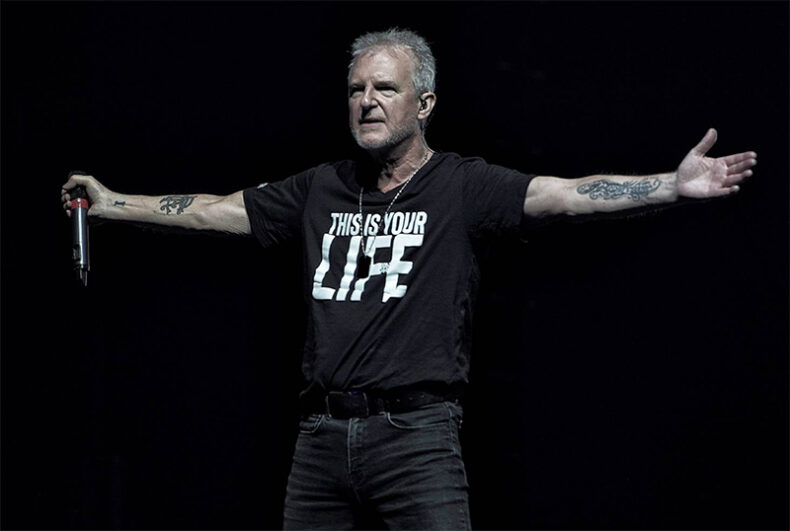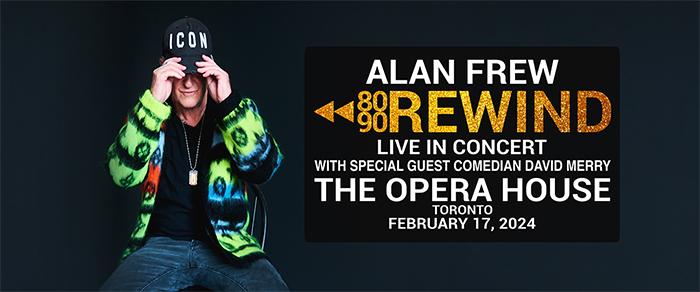REWIND
A CONVERSATION WITH ALAN FREW OF GLASS TIGER
My riveting conversation with the legendary Alan Frew, lead singer for iconic Canadian band Glass Tiger and successful solo artist, took us on a captivating voyage through the archives of his musical journey. As we delved into the depths of his experiences both with the band and in his solo endeavors, we uncovered a tapestry woven with the threads of artistic passion, resilience, and boundless creativity.
Our discussion became a portal, offering a glimpse into the remarkable chronicles of Glass Tiger—an ensemble that has etched its name in the hallowed halls of Canadian music history. But the conversation didn’t merely dwell in the nostalgia of Glass Tiger’s triumphs; it extended into the present and future as we explored Frew’s solo venture. The transition from a celebrated band to an individual artist is a metamorphosis loaded with challenges and triumphs, and his reflections provided a nuanced perspective on this transformative journey. From the origins of his solo albums to the intricacies of his latest projects, we navigated the ever-evolving landscape of Alan Frew’s musical narrative.
Glass Tiger’s journey began in 1981, and their breakthrough in 1986 marked a turning point. Playing in bars initially, they strategically introduced original songs, eventually realizing their potential when the venues started filling up. Before long, they signed with a label, solidifying their path to success. “Back when we first started playing, bar owners didn’t want to hear original songs, they wanted us to play the hit songs that were topping the charts at the time. What we used to do was squeeze in an original song during our set and disguise it as a cover. We would say it was from a new band in England called Thin Red Line. No bar owner was going to validify the truth to it and well, it worked. When we noticed that the bars were getting more filled by the day, and had lines wrapping around the building, that’s when we knew we had something”.
When creating the hit records “Don’t Forget Me When I’m Gone”, and “Someday” the band didn’t anticipate their success; they simply knew they had something good, leaving the judgment to the public. “We got introduced to a man named Jim Vallance who eventually became our producer for our first two albums. We flew out to Vancouver and on the very first day that we ever worked with Jim, we wrote “Don’t Forget Me When I’m Gone” and “Someday”. We knew we had something good; we just didn’t know how good. I’m sure other bands would agree that you never know what kind of song you have until the public decides what type of song you have.”
Transitioning from a band to a solo artist proved seamless for Alan. The freedom to explore different styles is liberating, allowing him to perform hits that Glass Tiger wouldn’t typically play. Despite his success as a solo artist, Alan sees it as an extension of his musical journey, testing his vocals in unique ways. “Glass Tiger peaked from 1986 to 1992. After that I needed a break and so I recorded some solo albums in the 90s. I got comfortable with the transition into the solo stuff so that part wasn’t difficult. What’s fun about it now is that with the 80290 Rewind, I get to perform these brilliant songs in the clubs for fun and with no pressure. I always say to anyone coming out to the show to dress in your best 80s and 90s gear and have a blast! I get to sing all these songs that I love in the original keys and as close to the original which makes it fun for everybody. It’s more freeing in the form of getting the opportunity to have other players up there with me. It’s certainly liberating getting to perform these hits that I didn’t write, and that Glass Tiger wouldn’t do. But remember, I’m still very much Glass Tiger and fans are not mourning the band; this is just something on the side that I get to do and get to have a lot of fun with”.
When it comes to expressing himself, Alan sees music as a foundation for vocal expression, emphasizing the importance of lyrics. “I always see the music as a beautiful foundation to allow the vocalist to express themselves. I’m not a fan of music that tends to let the vocalist be one of the instruments. I tend to enjoy where the music is grounds for the vocalist to build and express themselves”.
Reflecting on today’s concert crowds, Alan observes the impact of technology on audience engagement. While phones are prevalent, his timeless songs encourage people to be present, singing along and enjoying the live music experience. “I just witnessed this as I just got back from a tour, and it stuns me yet fascinates me just how many people are willing to watch the show through their phones as opposed to being present. That said, I’m lucky that I have the type of songs that people want to truly sing along to and be present for. They’ll still have their phones, but you can see that it’s just bopping in their hands as they watch the show and sing along”.
In encapsulating the essence of his persona and musical repertoire, Alan Frew describes himself in three words: fun, vibrant, and meaningful. As he embarks on the continued trajectory of his solo journey, the next notable milestone beckons—a Toronto show scheduled for February 17, 2024, at The Opera House. This upcoming performance stands as a testament to Frew’s firm commitment to bringing his music directly to his fans, creating an intimate and unforgettable experience for all in attendance. The anticipation for this event is heightened by his spirited call to action. With an invitation to embellish oneself in the nostalgic threads of the ’80s and ’90s, attendees are not just spectators but active participants in a time travelling celebration of music and style.








